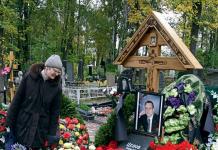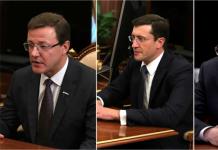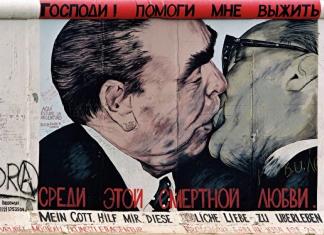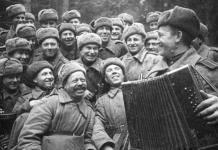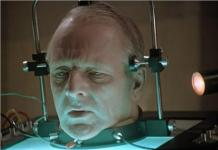The resignations of governors will continue, so you can interpret the answer of the press secretary of the President of the Russian Federation Dmitry Peskov to the question of the TASS agency about whether the rotation of governors will continue next week. "The President continues to deal with regional issues," he said. The key here is the word "continues" - the very process that was launched on Monday, September 25, by the resignation of the governor of the Samara region Nikolai Merkushkin.
After that, they announced their departure - themselves, the heads of the Nizhny Novgorod region Valery Shantsev and the Krasnoyarsk Territory Viktor Tolokonsky. All three of them, together with Mr. Merkushkin, are quite mature figures. So, the head of Dagestan, Ramazan Abdulatipov, who also announced his resignation, quite accurately called what is happening a trend towards "greening" the governor's corps.
But then there was the resignation of the head of the Nenets Autonomous Okrug, quite a "green" 43-year-old Igor Koshin. True, he is the only one who himself explained this by moving to another job. According to some reports, the point is the results of the interaction of groups of influence in the oil region, which were unsuccessful for the former governor of the NAO.
Social work intensified in some places
All resignations were predicted by the Kommersant newspaper, which referred to its sources in the presidential administration. But not all the predicted changes of governors took place.
The list also includes the Ivanovo, Murmansk, Novosibirsk, Omsk regions and the Altai Territory. In addition, the prophetic article spoke about "one or two subjects in the North Caucasus." So far, the unnamed "number two" has not come true. However, Kommersant itself writes that such leaks always contain unnecessary information. Some people are named only as a warning, while others even manage to come to Moscow and agree to keep their posts, apparently promising to "intensify the work" on the most problematic positions. But at the moment, the list is only half completed, and judging by the words of Peskov, 2-3 more resignations are quite possible.
The governor of the Murmansk region denied her likely resignation, this happened on September 25, and on the 26th a message appeared that “The Ministry of Social Development of the Murmansk Region provided funds in the amount of about 32 million rubles to subordinate institutions - centers of social support for the population. for social security and other payments to the population of the region. This work is being carried out in accordance with the instructions given by the Governor of the Murmansk Region Marina Kovtun.” More information from the region has not yet been received (as of Friday evening).
Leaves and exclusions
The change of governors took place mainly for people who are clearly appointed as interim for a long time, with an eye on next year's elections. This is the former First Deputy Head of the Ministry of Industry and Trade Gleb Nikitin, appointed, in accordance with his previous duties, to the Nizhny Novgorod Region, which is saturated with military-industrial complex enterprises. Dmitry Azarov came to the Samara region, a man, as they say, from Samara to the marrow of his bones, who was a senator from this region. Alexander Tsybulsky, who until recently worked as deputy head of the Ministry of Economic Development, will lead the NAO.
These are all fairly young people. The exception is the old-timer of Krasnoyarsk politics Alexander Uss, who has seen many heads of the region, but now he himself is acting governor, and at the same time remains in his usual position of chairman of the Legislative Assembly of the region. This appointment appears to be temporary. And there is no new figure for the post of head of Dagestan yet.
Crises are not expected
For some reason, the resignations in a “package” turned out to be more important for the Kremlin than appointments. Perhaps this is due to the struggle that goes on for vacant posts, and which cannot be transferred to the necessary (more or less open) phase without first removing the current head of the region. There is, in general, nothing surprising, since such appointments, in a certain sense, are elections at the same time. And holding elections, even purely hardware ones, in an absolutely closed regime is possible only in either completely problem-free or completely unambiguous situations. Dagestan has never been problem-free, and the Krasnoyarsk Territory is also not easy.
Much has already been said about the coming to power of young technocrats, and this batch of resignations vividly confirms this thesis. The era of regionals-siloviki, even if one is supposed to head Dagestan, is generally over. This, by the way, means that political forecasting at the level of the highest echelons of power does not imply crises of a socio-economic nature with political development in the coming years. For such situations, experienced personnel would be needed. Or the same security forces, which does not mean the forceful suppression of hypothetical protests, but means the ability to manage poorly managed processes. Or the same experienced regionals, if not those that were in their posts, but from the old clip.
That is, according to official expectations, the economy does not inspire serious concerns. Moreover, at the end of last week, the regions received a deferment on debt payments, which were a very serious burden for a number of them. As far as politics is concerned, so far (after 1996) the presidential elections have turned out to be periods of consolidation capable of dampening even serious destabilization, as was the case in 2012. So from this side, too, apparently, it's time for a run-in of young personnel.
In September 2018, Russia will host a traditional voting day for elections at various levels. This includes changing heads of at least 25 Russian regions. Only in a small number of regions, elections will be held in connection with the expiration of the term of office of its head. In most cases, the resignations of governors were early, and it is obvious that the official wording “of their own free will” is at least crafty. Most of the resignations happened in the fall of 2017, but some of them happened this year. The resignations of governors in 2018 - in which regions their heads were fired, is it worth waiting for the continuation of sweeps in the governor's corps this year.
In which regions were the governors fired in the fall of 2017
A large-scale purge of the heads of regions happened in Russia at the end of September - the first half of October last year, shortly after a single voting day in 2017. Then the heads of the following regions were fired:
- Samara Region,
- Nizhny Novgorod Region,
- Nenets Autonomous Okrug,
- Krasnoyarsk region,
- The Republic of Dagestan,
- Primorsky Krai,
- Oryol Region,
- Novosibirsk region,
- Omsk region,
- Ivanovo region,
- Pskov region.
On the eve of the new year, the head of the Voronezh region was also dismissed. In total, thus, at the end of 2017, twelve heads of regions were dismissed. Their term of office is 2019-2020.
Nine more governors were fired in the first half of 2017. In these regions, new heads were elected in September 2017.
In the case of all the governors dismissed last fall, the wording was the same - “of their own free will”. In fact, of course, it was a purge carried out by the presidential administration. And as the real reasons for the dismissal, the media cited mainly the fact that the governors could not get along with the local elites or did their job poorly.
The most unpleasant thing in a series of gubernatorial resignations is that the federal government does not even hesitate to show who actually appoints the heads of regions. In Russia, direct elections of governors have formally returned, and almost all of the dismissed heads of regions were elected by people. However, just as the election procedure itself artificially creates a lack of alternatives for a candidate from power, so the governor himself knows perfectly well who actually elected him and cannot resist instructions in the form of recommendations from Moscow to leave his post.

The resignations of governors in 2018 - which have already taken place
In 2018, six more heads of regions “voluntarily” resigned. The first of a series of these cases stands out somewhat - it is about the resignation of Aman Tuleev from the post of head of the Kemerovo region. After the March tragedy in Kemerovo, when dozens of people, most of whom were children, were burned to death in the local shopping center Zimnyaya Cherry, Tuleyev behaved extremely ugly. It was obvious that he was most worried not because of what had happened, but because of how the Russian president would react to the situation.
Obsequious apologies to the head of state for the loss of population in the entrusted territory, accusations against the gathered relatives of the victims that they are hired buzzers. This is how Tuleev was remembered in the days of the tragedy.
At first it seemed that there would be no consequences for Tuleev from the Winter Cherry, but on April 1 he resigned.
In five more regions, the replacement of the governor's corps took place literally in the last two weeks - in the second half of May. In three cases out of five, the heads of regions became ministers of the new government of Russia:
- On May 18, the governor of the Tyumen region, Yakushev, left his post due to his appointment as Minister of Housing and Public Utilities in the federal government.
- On the same day, Kobylkin, the governor of the Yamalo-Nenets Autonomous Okrug, resigned due to his transfer to the post of Minister of Natural Resources.
- Finally, the Governor of the Amur Region, Kozlov, was appointed to the post of Minister for the Development of the Far East.
Spot cleaning was carried out on May 28 in two regions: the heads of the Magadan region and Yakutia left their posts.

Should we expect more resignations of governors in 2018?
On June 9 of this year, the deadline expires when you can fire some governors in the expectation that a new head of the region will be elected in the elections on September 9. If the Kremlin needs to replace some personnel in the posts of heads of regions, most likely, it will be necessary to wait for the dismissals of governors in the coming days.
However, such resignations are unlikely to happen. Analysts say there won't be a sweep like last year's for a variety of reasons.
First, last year's resignations were largely pre-election. It was important to replace the age-old governors with young ones in order to demonstrate the rejuvenation of personnel in the country. Unpopular governors were removed to increase the overall rating of power in the region.
Secondly, in 2018 there are quite a lot of elections of heads of regions without this. Taking into account the latest resignations, the heads will be replaced in 25 regions of Russia. In addition to the 12 regions where governors “voluntarily” resigned last fall and six resignations this spring, elections in seven more regions will be held on time. The powers of the heads of these regions expire in September 2018.
By all appearances, the necessary targeted replacements of personnel have been carried out by this point, and new resignations are possible only in extraordinary cases. For example, if the next governor is caught taking a bribe, or if one of the heads of regions has a sharp deterioration in health.
They include Ivanovo, Nizhny Novgorod, Murmansk, Samara and Omsk regions, Altai and Krasnoyarsk regions, as well as the Nenets Autonomous Okrug. Personnel changes in one or two regions of the North Caucasus are not ruled out, the newspaper writes.
Reaction in the regions
The administrations of the regions, in turn, hastened to refute this information.
So, the government of the Altai Territory said that the governor Alexander Karlin and his team are working as usual.
"These are just rumors," a spokesman for the region's authorities told RIA Novosti.
The Omsk region reacted in a similar way, calling reports of the planned resignation of Governor Viktor Nazarov "a wave of rumors."
According to his press secretary, this is all artificially created.
In turn, the government of the Ivanovo region said that the head of the region, Pavel Konkov, is working on schedule.
The administration of the governor and the government of the Novosibirsk region also noted that Vladimir Gorodetsky was not going to resign.
"Let the one who gives out such information comment on the rumors," the agency's interlocutor said, offering to ask all questions to the head of the region personally at the traditional weekly meeting with the media on Tuesday.
The governor of the Nenets Autonomous Okrug, Igor Koshin, links the resignation rumors to unpopular economic decisions that had to be made to restart the region's economy after the oil price crash.
"No one likes reforms, but everyone wants to enjoy their results. In real life, these results take time," he added.
Koshin stressed that three years have passed since the elections, and now the first results of the reboot of the region's economy are appearing. “Enterprises, even state-owned ones, began to work “in the market”, update the transport fleet, build new facilities - farms, slaughterhouses. A layer of young entrepreneurs has appeared, including in the countryside,” the governor explained.
The Governor is confident that the region is on the right path of development, as evidenced by the numbers, including the inflow of investment, the volume of housing construction, the resumption of road construction and the performance of farmers.
In turn, the assistant to the governor of the Murmansk region Marina Kovtun said that the head of the region and her team are working as usual.
Kovtun herself had previously written in her Twitter: "My credentials expire in September 2019."
Posted last week
Messages about the upcoming resignation of the governor of the Nizhny Novgorod region Valery Shantsev appeared on Thursday. Then the Kommersant newspaper wrote that such a decision was made at a meeting between the governor and the leadership of the presidential administration.
He later denied this information himself.
“How much I work, I’m going to leave so much. As soon as I get ready, I’ll definitely tell you about it. Now I’m not leaving,” the governor said.
On Friday and Saturday, the media reported on the alleged impending resignation of the governor of the Krasnoyarsk Territory, Viktor Tolokonsky. In particular, the sibnet.ru portal, citing a source close to the presidential administration, said that the resignation could take place as early as Monday.
Sources in the regional administration said that the governor works in the suburban residence "Sosny" and did not submit a letter of resignation.
Political scientist Alexander Chernyavsky believes that there are no objective reasons for Tolokonsky's resignation today.
According to him, rumors about leaving have been emerging for the third consecutive autumn. He noted that the Krasnoyarsk governor is at risk because of his retirement age, so "it is convenient for manipulating his political prospects."
Chernyavsky recalled the "salary scandal" when deputies of the Legislative Assembly of the Territory decided to raise their salaries to 200,000 rubles, but quickly changed their minds and declared that they had been misunderstood. He noted that only it can be attributed to force majeure negative events.
And appreciated their changers
The spring series of dismissals of governors has started in Russia. President Vladimir Putin has already accepted the resignation of the heads of the Chelyabinsk region and the Altai Republic. They say this is just the beginning. According to the speaker of the Federation Council Valentina Matvienko, the governor's "starfall" may end in mid-April. According to information from the Murmansk region, the head of the region, Marina Kovtun, also wrote a letter of resignation. But it has not yet been adopted by the President. In total, a change of power in the near future is predicted in six regions.
In Kalmykia, there was already the head of the republic - a chess player. Now there will be a kickboxer, Batu Khasikov.
In September this year, gubernatorial elections are scheduled in 18 regions of the Russian Federation, in nine of them the heads were dismissed last fall. And if the authorities explained the autumn "governor's fall" with a "request for renewal", and political scientists - with switching the agenda from the pension reform, then in the spring, "outsiders of electability" resign. “Those are leaving whose election could end the way the election of Orlova or Zimin ended. Although there are differences in the current resignations - and this is the term of operation of the governor. But in any case, these are the people whose election would be possible only if the candidate had no alternative. And even that, probably, and this could become a problem,” political scientist Konstantin Kalachev believes.
A series of layoffs began in the Chelyabinsk region. On Tuesday evening, Boris Dubrovsky, who has led the region for five years, sent an appeal to Putin asking him to be relieved of his post. The politician stressed that this was his personal decision and thanked the residents for their support. True, the day before, the Federal Antimonopoly Service accused the governor of anti-competitive collusion with the Yuzhuralmost company.
And with the support of the residents, Berdnikov did not go smoothly: for five years, the representative of Magnitogorsk did not become his own for the people of Chelyabinsk. Aleksey Teksler, whom Vladimir Putin appointed acting governor of the region, although he was born and raised in Chelyabinsk, is still not quite his own for the local elite. As they say, his formation took place in Norilsk, and specifically - in the Norilsk Nickel group. A graduate of the Norilsk Industrial Institute since the 1990s, he has been in close contact with the current Energy Minister Alexander Novak, whose deputy he was until recently. The 46-year-old Texler is called the “manager of the new wave,” although he notes that he has no political experience.
If Dubrovsky decided to leave his post at the end of his first term, then the head of the Altai Republic, Alexander Berdnikov, was the head of the region for more than 13 years. Experts call his reign a "lost decade". They say that during this time no progress has been made in the socio-economic state of the region. Oleg Khorokhordin, chairman of the board of the non-profit partnership Glonass, has been appointed acting head of the republic. Like Texler, Khorokhordin has a very conditional relationship to the region to which he is appointed acting - he is a native of the neighboring Altai Territory. But he is also a "young technocrat" who is now in demand in the Kremlin.
But castling in Kalmykia looks non-standard. Having accepted the resignation of the head of the republic, Alexei Orlov, who had been at the helm for 8 years, the president appointed Bata Khasikov, 38, an acting kickboxer. Of course, Batu Khasikov has recently worked as an adviser to the head of Rosmolodezh, and was also a representative in the Federation Council from Kalmykia. But his reputation is not perfect: in 2016, he was stripped of his Ph.D. in political sciences for plagiarism.
Political scientist Abbas Gallyamov believes that the main criterion for the appointment of an interim is that some “respectable people” should petition for a person. “And that could be a big problem. A good deputy minister will not necessarily turn out to be a strong public politician, and you cannot calculate this in advance. Therefore, the Kremlin risks that the new interim, instead of calming the situation, on the contrary, will provoke a surge of discontent,” he commented on the new appointments to MK.
Political scientist Konstantin Kalachev also called the new appointments controversial:
Perhaps the loudest in Kalmykia. Of course, Khasikov has a good biography: an athlete, a kickboxer, a public figure. It is clear that kickboxing is a good thing and the sport needs to be developed. But work in Rosmolodezh or membership in the Federation Council is not an economic activity. And for Kalmykia, the most important thing is economic growth. In addition, he has reputational problems and an obvious lack of certain competencies. Although at the election stage the popularity of an athlete will help him, and then it will depend on whether he can form a capable team of people who will be experts in those issues in which he himself is not well versed.
Chelyabinsk is also interesting, because before that there were rumors that Texler could head the Murmansk region. There is a question about the bench. I should note that the number of people who refuse the opportunity to become governors is growing year by year. It's a thankless task now.
As for the general selection criteria, all these people should be systemic, loyal to the Kremlin, without pronounced political ambitions and political views, having an idea of how the federal power structure works, what is the role of the Presidential Administration, and so on. But now, apparently, the bench is not too large, and therefore a unified approach cannot always be implemented.
Russia is shaken by the resignation of governors for the second day. The heads of the Chelyabinsk region, Boris Dubrovsky, of the Altai Republic, Alexander Berdnikov, and Kalmykia, Alexei Orlov, have already left. The media reported on the imminent resignation of the head of the Murmansk region, Marina Kovtun. All the heads of regions who left their posts wrote a letter of voluntary resignation. Why the resignations are happening right now and why the country's leadership decided to rejuvenate the governor's corps - in the material "360".
predicted departures
The Vedomosti newspaper was the first to report on the spring resignations, citing sources close to the Kremlin. The publication predicted the departure of the leaders of six regions - the forecast for the first two days came true by half. The heads of the Chelyabinsk region, as well as the leaders of the Republic of Altai and Kalmykia, resigned. There is no official confirmation that Marina Kovtun will leave the chair of the governor of the Murmansk region yet.
According to forecasts, the head of the Orenburg region, Yuri Berg, and the governor of the Volgograd region, Andrei Bocharov, are next to be eliminated.
What the leaders of the regions who left their posts have in common is that their term of office expires this year and they all wrote voluntary resignations. Experts interviewed by 360 felt that this was nothing more than a cover.
“I don’t think it’s all at the call of the soul. There must have been consultations. And, most likely, they realized that they would not be elected. On the other hand, the authorities simply got their hands on them,” he said.
Evgeny Minchenko, the president of the Minchenko Consulting communications holding, agreed with him.
“As for the voluntary nature of these resignations, we understand that they are all voluntary-compulsory. I know for certain that Dubrovsky, and Berdnikov, and Orlov tried to hold on to their positions to the last, ”he said.
Director of the Institute of Contemporary State Development Dmitry Solonnikov called the situation with the resignations of three governors a planned rotation. He explained that initially, the governors were instructed to hold the post of head of the regions for no more than two terms, after which they should look for another job.
“We are accustomed to the fact that you can be in power in your subject of the federation almost forever, changing the legislation every time in order to extend the powers. But the rule that two terms - and that's it, was initially stipulated. We are now returning to this, and we need to get used to it. Quite a logical, normal, healthy system,” he assessed the past resignations.
He explained voluntary layoffs from three positions: the governor himself understands that the upcoming elections will not take place; the federal center got acquainted with the data of opinion polls of the population of the region and realized that it was time to change the government there; the head of the region received a more interesting offer, which is better to use now.
The chances of re-election of the retired governors in the upcoming elections were small, Leonid Davydov shared his opinion. “Therefore, ballast removal is a natural process,” he explained.
Another reason for the emergence of new faces as leaders of the region is the policy of rejuvenating the authorities.
“For a long time, the leadership of the region meant that a person would be old enough. Then people came to the regional leadership at the age of 50 years. This was considered normal, and we practically did not have the practice of electing 30-40-year-old heads of regions. After 10-15 years, they are now all over 60 or so. Therefore, resignations are a completely logical process associated with the long leadership of the region and the already venerable age,” Dmitry Solonnikov said.
With the fact that there is a course for rejuvenation, Yevgeny Minchenko also agreed. But he noted that at the same time, of course, the rating and anti-rating of the governor, as well as the presence or absence of criminal cases, affect the resignation.
“If we are talking, for example, about the Chelyabinsk region, then there were a lot of questions from the security forces to Boris Dubrovsky. At the beginning of this week, a rather tough document of the Federal Antimonopoly Service was published,” he said.
Time to shoot and assign
The main resignations of governors in Russia take place in spring or autumn. At the same time, the interviewed political scientists agreed that it is best to do this in the first third of the year. During the time remaining before the elections, the new appointees will be able to get up to speed, prepare the region for the heating season and approve budgets.
But the main positive moment for the interim governors, Yevgeny Minchenko, called the effect of novelty, which the head of the region brings to his future voters.
“Spring resignations are more comfortable, because a year before the election to appoint an interim governor - he loses the effect of novelty, the “honeymoon” effect. And it will become more difficult to act as a figure that is associated with positive expectations,” he said.
Residents of the Chelyabinsk region, the Republic of Altai and Kalmykia will now expect positive changes from three new interim governors.
The governor of Kalmykia, Alexei Orlov, was replaced by the athlete Batu Khasikov. He used to
Former Deputy Minister of Energy Alexei Teksler went to the capital of the Southern Urals. According to Leonid Davydov, this official has long been predicted the position of governor.
For Chelyabinsk, he is not a stranger, but not quite his own either. Until the age of 16, he lived in this city, after which he moved to the Krasnoyarsk Territory, where he studied in Norilsk, and then headed the structures of Norilsk Nickel. As a manager, he managed to lead the northern city as a city manager, after which he went to work in the Ministry of Energy. As a governor, Texler should not be underestimated, Yevgeny Minchenko considered.
“Aleksey Teksler was not just a deputy, but a first deputy minister of energy. Moreover, he had a very large amount of authority and a very large sphere of influence,” he stressed.
Oleg Khorokhordin, chairman of GLONASS, went to Gorno-Altaisk. Formally, he, like Texler, can be considered local. He was born in the neighboring Altai Territory and worked at local enterprises until the early 2000s. Until he went to work for the plenipotentiary of the Central Federal District Georgy Poltavchenko, and then to the presidential internal policy department.
Both new leaders of the region joined the list of governors-graduates of the Russian Academy of National Economy and Public Administration under the President of the Russian Federation (RANEPA).
“RANEPA has a big program that they are doing on the instructions of the president, a program for retraining managerial personnel. A lot of people went through it: Alexei Teksler, and Khorokhordin, and many others who occupied one or another significant position, ”said Yevgeny Minchenko.
According to political scientist Dmitry Solonnikov, the connection with the region for the acting governor and his education are not the main factors for the appointment.
“It seems to me that the game of these centers of power is becoming the most important, the most relevant. The alignment of various groups of influence by region is becoming more and more important, more and more relevant. And therefore, you need to look at who is behind this or that appointment, and not what kind of education he has or what region he comes from, ”he explained.
Political scientists also answered the question whether the Leaders of Russia program, which is supervised by the head of the Higher School of Public Administration of the RANEPA Alexei Komissarov, can release a potential future official.
Yevgeny Minchenko called this program an attempt to copy the model that the Communist Party of the Soviet Union had, when it was possible to grow from the Komsomol to significant positions.
Dmitry Solonnikov once again clarified that for the appointment of the leaders of the region, participation in such a competition would only be an additional opportunity to advance. Basically, a potential official will have to go through a series of approvals in any case, taking into account the interests of various structures.
"Leaders of Russia" are in the framework of the personnel policy of Sergei Vladilenovich Kiriyenko. This is his program, these are his ideas, his methods that he brings to work.<…>But the fact that, due to one competition, a person can be appointed to responsible government positions, this is such a dubious practice. I don't think that's what they're following," he explained.
At the same time, Solonnikov noted that opinions differ about the project itself. There is an opinion that he is supported by the president, who met with the participants of the competition, but, on the other hand, Vladimir Putin did not come to the final, which can be seen as a negative attitude on his part.
“The project remains one of the active social elevators and an element of influence of the group that stands behind Sergei Vladilenovich Kiriyenko. But it is not beneficial to everyone and not everyone is satisfied. This is the tool that legitimizes Kiriyenko's henchmen,” the expert summed up.
Perspectives of Berg
Another on the list of governors who may lose their post is the head of the Orenburg region, Yuri Berg. It was reported that Igor Komarov, the plenipotentiary representative of the Volga Federal District, was allegedly not very pleased with his activities. However, in the Berg administration, such information was called rumors. One way or another, according to experts, in order to remove Berg from office, this is not enough.
“There are other sources of information. The plenipotentiary gives his information, the security forces - theirs, the Ministry of Economic Development - theirs. And in the end, it all comes together in one whole,” said Dmitry Solonnikov.
According to Yevgeny Minchenko, Yuri Berg is one of the strongest governors today. After the scandalous resignation of the mayor of the capital of the region, Yevgeny Arapov, Dmitry Kulagin, one of the most trusted people of the governor, became the head of the city. So Yuri Berg strengthens his team.
“Also, Vladimir Putin has a rather positive attitude towards him personally, but there is really a problem associated with age,” Yevgeny Minchenko noted.
Single voting day
This year, the election of leaders will be held in 16 regions of the country. In two of them they will take place ahead of schedule: on Sakhalin and in the Trans-Baikal Territory.
“On Sakhalin, Kozhemyako left his post ahead of schedule, moving to a neighboring region. In the Trans-Baikal Territory - due to the fact that the leadership really did not cope with its work and had to resign, ”said Dmitry Solonnikov.
Heads of 11 regions will get rid of the prefix "interim acting". The leaders of the Vologda, Murmansk, Volgograd and Orenburg regions are going to re-elections. If nothing changes soon.
people shared an article






